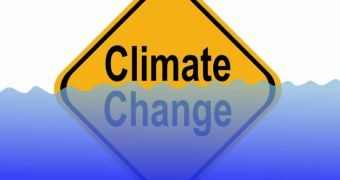This March 31, the Intergovernmental Panel on Climate Change released a new report saying that climate change is as real as it gets, and constitutes a threat to food, security, and mankind as a whole.
Besides, the report in question shows that said phenomenon is not something that will hit human society at some point in the future, but something that is affecting the planet in real time.
More precisely, the Intergovernmental Panel on Climate Change links global warming to melting sea ice and to the thawing of the permafrost in the Arctic. The phenomenon is also argued to be killing coral reefs, and to be fostering heat waves and other natural disasters such as heavy rains.
“Observed impacts of climate change have already affected agriculture, human health, ecosystems on land and in the oceans, water supplies, and some people's livelihoods.”
“The striking feature of observed impact is that they are occurring from the tropics to the poles, from small islands to large continents, and from the wealthiest countries to the poorest,” the Panel writes in a statement.
As if having climate change foster all these problems were not enough, the folks who pieced together this report argue that the worst is yet to come, and that, under a business-as-usual scenario, this phenomenon will soon impact on global food stocks and even on international security.
What's more, it is argued that the global food supply is already experiencing the effects of climate change, meaning that crop yields across the world are beginning to decline. By the looks of it, wheat crops are the ones most likely to be affected by this phenomenon, The Guardian informs.
Given the fact that the world's population is expected to increase in the years to come, a decline in global crop yields in the near future will likely spell famine in several regions across the world. Should a reduction in crop yields cause food prices to up, this might lead to political unrest in some areas.
The Intergovernmental Panel on Climate Change goes on to argue that, apart from crops, other food sources are likely to also be affected by said phenomenon. Specifically, it is likely that fish catches in some areas in the tropics will drop by as much as 40-60% in the not so distant future.
Specialists with the Panel say that, according to their investigations into the matter at hand, those most likely to be affected by the extreme weather manifestations and natural disasters brought about by climate change are the poor, the weak, and the elderly.
“We live in an era of man-made climate change. In many cases, we are not prepared for the climate related risks that we already face. Investments in better preparation can pay dividends both for the present and for the future,” Vicente Barros, co-chair of the Intergovernmental Panel's Working Group II, said in a statement.
On its website, green group the World Wildlife Fund explains that the report issued by the Intergovernmental Panel on Climate Change is the second in a series of four that the world's leading climate authorities has in the works.
The organization argues that the report, which documents the vulnerability of human and natural systems to climate change, clearly shows that greenhouse gas emissions must be reduced without delay, and that investments must be made in adaptation.
Since people living in developing countries are the ones most likely to be affected by climate change, the World Wildlife Fund stresses that climate adaptability measures must be implemented in such regions without delay. Then again, collective action on this phenomenon is the best way to go, the organization maintains.
“This report tells us that we have two clear choices: cut emissions now and invest in adaption - and have a world that has challenging and just barely manageable risks; or do nothing and face a world of devastating and unmanageable risks and impacts,” Samantha Smith, the current leader of the organization's Global Climate & Energy Initiative argued.
Furthermore, “The report makes it clear that we still have time to act. We can limit climate instability and adapt to some of the changes we see now. But without immediate and specific action, we are in danger of going far beyond the limits of adaptation.”

 14 DAY TRIAL //
14 DAY TRIAL //